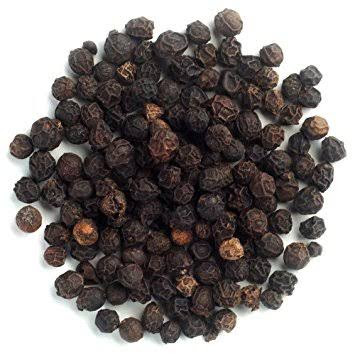Black Pepper: Unending Benefits Of The King Of Spices
Black pepper is one of the most commonly used spices worldwide.
It has a sharp and mildly spicy flavor that goes well with many dishes.
But black pepper is more than just a kitchen staple.
Known as the “King of Spices,” black pepper has been valued for its flavor, antibacterial, antioxidant, and anti-inflammatory benefits.
Antioxidant Activity
Piperine found in black pepper inhibit free radicals and reactive oxygen species, therefore
known to possess protective effects against oxidative damage.
Anti-inflammatory Activity
The chemical compounds of black pepper, particularly piperine, may be effective in the early acute inflammatory process.
Anti-cancer Activity
Piper nigrum had been reported to inhibit tumors formation in different experimental models. Piperine is non-genotoxic and found to possess anti-mutagenic
and anti-tumor influences.
Antimicrobial activity of black pepper
The antibacterial potentials of black pepper, bay leaf, aniseed, and coriander were tested against different bacterial and Black pepper showed strongest antibacterial activity.
People take black pepper by mouth for arthritis, asthma, upset stomach, bronchitis, a bacterial infection that causes diarrhea (cholera), colic, depression, diarrhea, gas, headache, sex drive, menstrual pain, stuffy nose, sinus infection, dizziness, discolored skin (vitiligo), weight loss, and cancer.
People apply black pepper to the skin for measles, nerve pain, itchy skin caused by mites (scabies), and to treat pain.
People inhale black pepper oil to prevent falls, to help quit smoking, and for trouble swallowing.
In foods, black pepper and black pepper oil are used as a spice.
It has a sharp and mildly spicy flavor that goes well with many dishes.
But black pepper is more than just a kitchen staple.
Known as the “King of Spices,” black pepper has been valued for its flavor, antibacterial, antioxidant, and anti-inflammatory benefits.
Antioxidant Activity
Piperine found in black pepper inhibit free radicals and reactive oxygen species, therefore
known to possess protective effects against oxidative damage.
Anti-inflammatory Activity
The chemical compounds of black pepper, particularly piperine, may be effective in the early acute inflammatory process.
Anti-cancer Activity
Piper nigrum had been reported to inhibit tumors formation in different experimental models. Piperine is non-genotoxic and found to possess anti-mutagenic
and anti-tumor influences.
Antimicrobial activity of black pepper
The antibacterial potentials of black pepper, bay leaf, aniseed, and coriander were tested against different bacterial and Black pepper showed strongest antibacterial activity.
People take black pepper by mouth for arthritis, asthma, upset stomach, bronchitis, a bacterial infection that causes diarrhea (cholera), colic, depression, diarrhea, gas, headache, sex drive, menstrual pain, stuffy nose, sinus infection, dizziness, discolored skin (vitiligo), weight loss, and cancer.
People apply black pepper to the skin for measles, nerve pain, itchy skin caused by mites (scabies), and to treat pain.
People inhale black pepper oil to prevent falls, to help quit smoking, and for trouble swallowing.
In foods, black pepper and black pepper oil are used as a spice.




Comments
Post a Comment